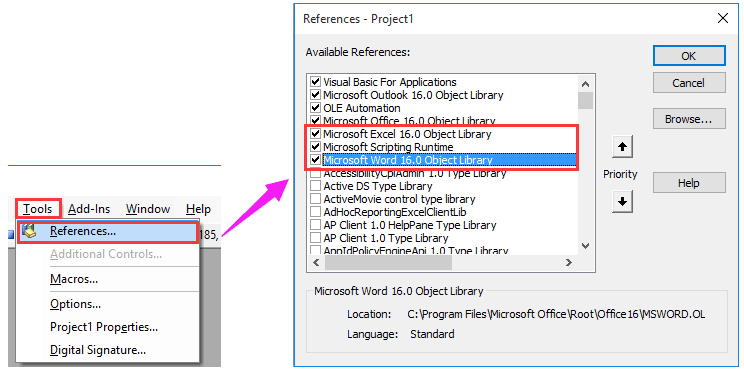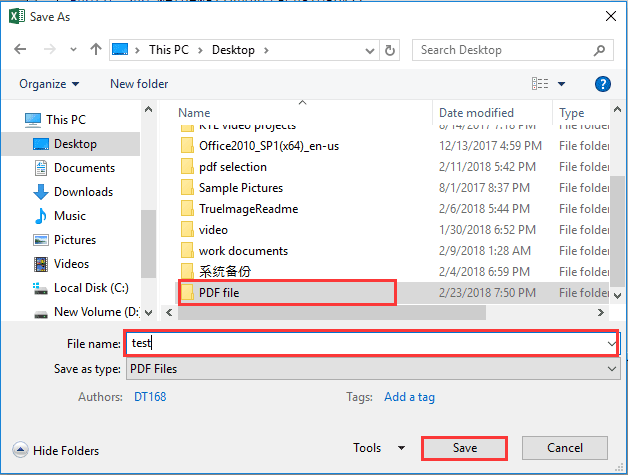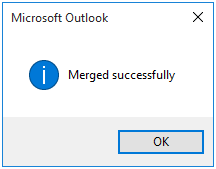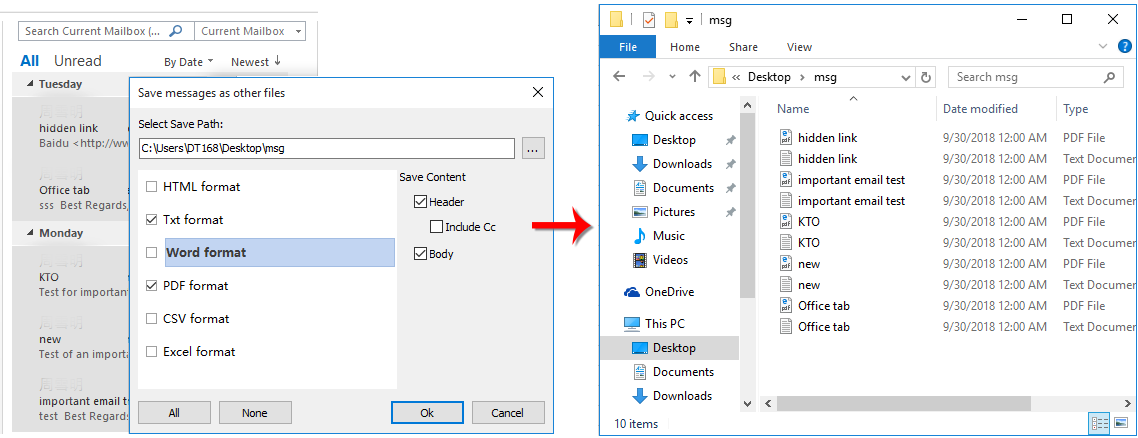Come convertire o salvare email e allegati in un unico file PDF in Outlook?
Questo articolo parla di come salvare un messaggio di posta elettronica e tutti gli allegati in esso contenuti in un unico file PDF in Outlook.
Convertire o salvare email e allegati in un unico file PDF con il codice VBA
Convertire o salvare email e allegati in un unico file PDF con il codice VBA
Si prega di seguire i passaggi seguenti per salvare un'email con tutti i suoi allegati in un unico file PDF in Outlook.
1. Seleziona un'email con allegati che desideri salvare in un unico file PDF, quindi premi i tasti Alt + F11 per aprire la finestra Microsoft Visual Basic for Applications.
2. Nella finestra Microsoft Visual Basic for Applications, clicca su Inserisci > Modulo. Dopodiché, copia il seguente codice VBA nella finestra Modulo.
Codice VBA: Salva email e allegato in un unico file PDF
Public Sub MergeMailAndAttachsToPDF()
'Update by Extendoffice 2018/3/5
Dim xSelMails As MailItem
Dim xFSysObj As FileSystemObject
Dim xOverwriteBln As Boolean
Dim xLooper As Integer
Dim xEntryID As String
Dim xNameSpace As Outlook.NameSpace
Dim xMail As Outlook.MailItem
Dim xExt As String
Dim xSendEmailAddr, xCompanyDomain As String
Dim xWdApp As Word.Application
Dim xDoc, xNewDoc As Word.Document
Dim I As Integer
Dim xPDFSavePath As String
Dim xPath As String
Dim xFileArr() As String
Dim xExcel As Excel.Application
Dim xWb As Workbook
Dim xWs As Worksheet
Dim xTempDoc As Word.Document
On Error Resume Next
If (Outlook.ActiveExplorer.Selection.Count > 1) Or (Outlook.ActiveExplorer.Selection.Count = 0) Then
MsgBox "Please Select a email.", vbInformation + vbOKOnly
Exit Sub
End If
Set xSelMails = Outlook.ActiveExplorer.Selection.Item(1)
xEntryID = xSelMails.EntryID
Set xNameSpace = Application.GetNamespace("MAPI")
Set xMail = xNameSpace.GetItemFromID(xEntryID)
xSendEmailAddr = xMail.SenderEmailAddress
xCompanyDomain = Right(xSendEmailAddr, Len(xSendEmailAddr) - InStr(xSendEmailAddr, "@"))
xOverwriteBln = False
Set xExcel = New Excel.Application
xExcel.Visible = False
Set xWdApp = New Word.Application
xExcel.DisplayAlerts = False
xPDFSavePath = xExcel.Application.GetSaveAsFilename(InitialFileName:="", FileFilter:="PDF Files(*.pdf),*.pdf")
If xPDFSavePath = "False" Then
xExcel.DisplayAlerts = True
xExcel.Quit
xWdApp.Quit
Exit Sub
End If
xPath = Left(xPDFSavePath, InStrRev(xPDFSavePath, "\"))
cPath = xPath & xCompanyDomain & "\"
yPath = cPath & Format(Now(), "yyyy") & "\"
mPath = yPath & Format(Now(), "MMMM") & "\"
If Dir(xPath, vbDirectory) = vbNullString Then
MkDir xPath
End If
EmailSubject = CleanFileName(xMail.Subject)
xSaveName = Format(xMail.ReceivedTime, "yyyymmdd") & "_" & EmailSubject & ".doc"
Set xFSysObj = CreateObject("Scripting.FileSystemObject")
If xOverwriteBln = False Then
xLooper = 0
Do While xFSysObj.FileExists(yPath & xSaveName)
xLooper = xLooper + 1
xSaveName = Format(xMail.ReceivedTime, "yyyymmdd") & "_" & EmailSubject & "_" & xLooper & ".doc"
Loop
Else
If xFSysObj.FileExists(yPath & xSaveName) Then
xFSysObj.DeleteFile yPath & xSaveName
End If
End If
xMail.SaveAs xPath & xSaveName, olDoc
If xMail.Attachments.Count > 0 Then
For Each atmt In xMail.Attachments
xExt = SplitPath(atmt.filename, 2)
If (xExt = ".docx") Or (xExt = ".doc") Or (xExt = ".docm") Or (xExt = ".dot") Or (xExt = ".dotm") Or (xExt = ".dotx") _
Or (xExt = ".xlsx") Or (xExt = ".xls") Or (xExt = ".xlsm") Or (xExt = ".xlt") Or (xExt = ".xltm") Or (xExt = ".xltx") Then
atmtName = CleanFileName(atmt.filename)
atmtSave = xPath & Format(xMail.ReceivedTime, "yyyymmdd") & "_" & atmtName
atmt.SaveAsFile atmtSave
End If
Next
End If
Set xNewDoc = xWdApp.Documents.Add("Normal", False, wdNewBlankDocument, False)
Set xFilesFld = xFSysObj.GetFolder(xPath)
xFileArr() = GetFiles(xPath)
For I = 0 To UBound(xFileArr()) - 1
xExt = SplitPath(xFileArr(I), 2)
If (xExt = ".xlsx") Or (xExt = ".xls") Or (xExt = ".xlsm") Or (xExt = ".xlt") Or _
(xExt = ".xltm") Or (xExt = ".xltx") Then 'conver excel to word
Set xWb = xExcel.Workbooks.Open(xPath & xFileArr(I))
Set xTempDoc = xWdApp.Documents.Add("Normal", False, wdNewBlankDocument, False)
Set xWs = xWb.ActiveSheet
xWs.UsedRange.Copy
xTempDoc.Content.PasteAndFormat wdFormatOriginalFormatting
xTempDoc.SaveAs2 xPath & xWs.Name + ".docx", wdFormatXMLDocument
xWb.Close False
Kill xPath & xFileArr(I)
xTempDoc.Close wdDoNotSaveChanges, wdOriginalDocumentFormat, False
End If
Next
xExcel.DisplayAlerts = True
xExcel.Quit
xFileArr() = GetFiles(xPath)
'Merge Documents
For I = 0 To UBound(xFileArr()) - 1
xExt = SplitPath(xFileArr(I), 2)
If (xExt = ".docx") Or (xExt = ".doc") Or (xExt = ".docm") Or (xExt = ".dot") Or _
(xExt = ".dotm") Or (xExt = ".dotx") Then
MergeDoc xWdApp, xPath & xFileArr(I), xNewDoc
Kill xPath & xFileArr(I)
End If
Next
xNewDoc.Sections.Item(1).Range.Delete wdCharacter, 1
xNewDoc.SaveAs2 xPDFSavePath, wdFormatPDF
xNewDoc.Close wdDoNotSaveChanges, wdOriginalDocumentFormat, False
xWdApp.Quit
Set xMail = Nothing
Set xNameSpace = Nothing
Set xFSysObj = Nothing
MsgBox "Merged successfully", vbInformation + vbOKOnly
End Sub
Public Function SplitPath(FullPath As String, ResultFlag As Integer) As String
Dim SplitPos As Integer, DotPos As Integer
SplitPos = InStrRev(FullPath, "/")
DotPos = InStrRev(FullPath, ".")
Select Case ResultFlag
Case 0
SplitPath = Left(FullPath, SplitPos - 1)
Case 1
If DotPos = 0 Then DotPos = Len(FullPath) + 1
SplitPath = Mid(FullPath, SplitPos + 1, DotPos - SplitPos - 1)
Case 2
If DotPos = 0 Then DotPos = Len(FullPath)
SplitPath = Mid(FullPath, DotPos)
Case Else
Err.Raise vbObjectError + 1, "SplitPath Function", "Invalid Parameter!"
End Select
End Function
Function CleanFileName(StrText As String) As String
Dim xStripChars As String
Dim xLen As Integer
Dim I As Integer
xStripChars = "/\[]:=," & Chr(34)
xLen = Len(xStripChars)
StrText = Trim(StrText)
For I = 1 To xLen
StrText = Replace(StrText, Mid(xStripChars, I, 1), "")
Next
CleanFileName = StrText
End Function
Function GetFiles(xFldPath As String) As String()
On Error Resume Next
Dim xFile As String
Dim xFileArr() As String
Dim xArr() As String
Dim I, x As Integer
x = 0
ReDim xFileArr(1)
xFileArr(1) = xFldPath '& "\"
xFile = Dir(xFileArr(1) & "*.*")
Do Until xFile = ""
x = x + 1
xFile = Dir
Loop
ReDim xArr(0 To x)
x = 0
xFile = Dir(xFileArr(1) & "*.*")
Do Until xFile = ""
xArr(x) = xFile
x = x + 1
xFile = Dir
Loop
GetFiles = xArr()
End Function
Sub MergeDoc(WdApp As Word.Application, xFileName As String, Doc As Document)
Dim xNewDoc As Document
Dim xSec As Section
Set xNewDoc = WdApp.Documents.Open(filename:=xFileName, Visible:=False)
Set xSec = Doc.Sections.Add
xNewDoc.Content.Copy
xSec.PageSetup = xNewDoc.PageSetup
xSec.Range.PasteAndFormat wdFormatOriginalFormatting
xNewDoc.Close
End Sub3. Clicca su Strumenti > Riferimenti per aprire la finestra di dialogo Riferimenti. Seleziona le caselle Microsoft Excel Object Library, Microsoft Scripting Runtime e Microsoft Word Object Library, quindi clicca sul pulsante OK. Vedi screenshot:

4. Premi il tasto F5 o clicca sul pulsante Esegui per eseguire il codice. Poi si aprirà una finestra di dialogo Salva con nome, specifica una cartella dove salvare il file, dai un nome al file PDF e clicca sul pulsante Salva. Vedi screenshot:

5. Si aprirà una finestra di dialogo di Microsoft Outlook, clicca sul pulsante OK.

Ora l'email selezionata con tutti i suoi allegati è stata salvata in un unico file PDF.
Nota: Questo script VBA funziona solo per gli allegati di Microsoft Word ed Excel.
Salva facilmente le email selezionate in diversi formati di file in Outlook:
Con l'utilità Bulk Save di Kutools per Outlook, puoi facilmente salvare più email selezionate come file individuali in formato HTML, file in formato TXT, documento Word, file CSV e anche file PDF in Outlook come mostrato nello screenshot qui sotto. Scarica ora la versione gratuita di Kutools per Outlook!

Articoli correlati:
- Come utilizzare il pulsante Comando per salvare il foglio di lavoro attivo come file PDF in Excel?
- Come salvare un foglio di lavoro come file PDF e inviarlo come allegato tramite Outlook?
- Come salvare la selezione o l'intera cartella di lavoro come PDF in Excel?
I migliori strumenti per la produttività in Office
Ultime notizie: Kutools per Outlook lancia la versione gratuita!
Scopri il nuovissimo Kutools per Outlook con oltre100 funzionalità straordinarie! Clicca per scaricare ora!
📧 Automazione Email: Risposta automatica (disponibile per POP e IMAP) / Programma invio Email / CC/BCC automatico tramite Regola durante l’invio delle Email / Inoltro automatico (Regola avanzata) / Aggiungi Saluto automaticamente / Dividi automaticamente Email multi-destinatario in messaggi singoli ...
📨 Gestione Email: Richiama Email / Blocca Email fraudulent (tramite Oggetto e altri parametri) / Elimina Email Duplicato / Ricerca Avanzata / Organizza cartelle ...
📁 Allegati Pro: Salva in Batch / Distacca in Batch / Comprimi in Batch / Salvataggio automatico / Distacca automaticamente / Auto Comprimi ...
🌟 Magia Interfaccia: 😊Più emoji belle e divertenti / Notifiche per le email importanti in arrivo / Riduci Outlook al posto di chiuderlo ...
👍 Funzioni rapide: Rispondi a Tutti con Allegati / Email Anti-Phishing / 🕘Mostra il fuso orario del mittente ...
👩🏼🤝👩🏻 Contatti & Calendario: Aggiungi in Batch contatti dalle Email selezionate / Dividi un Gruppo di Contatti in Gruppi singoli / Rimuovi promemoria di compleanno ...
Utilizza Kutools nella lingua che preferisci – supporta Inglese, Spagnolo, Tedesco, Francese, Cinese e oltre40 altre!


🚀 Download con un solo clic — Ottieni tutti gli Add-in per Office
Consigliato: Kutools per Office (5-in-1)
Un solo clic per scaricare cinque installatori contemporaneamente — Kutools per Excel, Outlook, Word, PowerPoint e Office Tab Pro. Clicca per scaricare ora!
- ✅ Comodità con un solo clic: scarica tutti e cinque i pacchetti di installazione in una sola azione.
- 🚀 Pronto per qualsiasi attività Office: installa i componenti aggiuntivi necessari, quando ti servono.
- 🧰 Inclusi: Kutools per Excel / Kutools per Outlook / Kutools per Word / Office Tab Pro / Kutools per PowerPoint